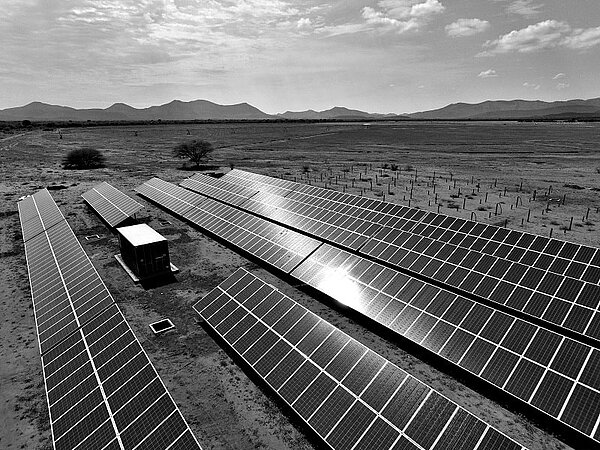Solar Power in South Africa
by Vivian Bullinger | 09.07.2020

The Big Five are at home here and many other species as well. The Thaba Tholo Game Farm in South Africa's Limpopo province is a remarkable project in more ways than one. A professional team of gamekeepers, breeding experts, and agricultural engineers work together with volunteers to preserve endangered species in the reserve. The 37,000-hectare area is home to rhinos, buffalos, antelopes, lions, impalas, wildebeests, and numerous other species. In addition, Thaba Tholo Farm has a number of exemplary social projects, aid and health services that directly benefit the local population. These include, for example, the supply of solar power for the irrigation system.
Solar Power for Irrigation
Thaba Tholo is committed to green energy and sustainability in all areas. The 750-kW solar field built by South African energy project developer Telenetix is part of a purpose-built island grid to ensure electrical supply. Among other things, the microgrid generates electricity for the region's own irrigation system in the arid region. For four years, there has been almost no rain at all in the region, which is a three-hour drive from Johannesburg. Telenetix is Solar-Log 's country partner in South Africa and is known for large energy infrastructure projects that always rely on photovoltaics.

Refrigerated Shipping Containers as a Home for Technology
Saving electricity permanently and keeping their own ecological footprint as small as possible - this is important to the Thaba Tholo team around Managing Director Rubin Els and General Manager Wouter Maree. Solar-Log comes into play with the solar system. A Solar-Log 2000 reliably monitors the functioning of the large solar plant. All the equipment needed to operate the power generation system is located in specially converted, refrigerated shipping containers on the grounds of the wildlife farm. This extends the service life of the components. At the same time, safety considerations play a major role here.
Full of Energy for People and Animals
The Thaba Tholo Wildlife Farm has been in existence for 30 years. In order to maintain genetic diversity and species richness, many specimens of individual species are housed in the reserve. The animals have sufficient space here and are only hunted selectively within narrow limits in order to maintain the natural balance. However, hunts are also offered in the reserve as a tourist attraction. Lions, leopards, hyenas and other predators provide a selection process without human intervention. "At Thaba Tholo, we believe that the treasure of African wildlife should be shared by all who live on this continent," says Rubin Els.
The game farm concept has been so successful that every year since 2008 there has been an auction where surplus animals are sold to zoos and wildlife parks. Last year, 223 animals were up for auction. Worldwide, bids can be placed via a corresponding app. The animals are coveted: a few years ago, a fabulous 10 million euros was paid for a breeding buffalo. The auction is an important building block for financing the work. Incidentally, Thaba Tholo lives off donations and the commitment of several wealthy families.
Solar Power a Better Future
Efforts to preserve the local wildlife are only part of Thaba Tholo's work. The employees find good working conditions here. Outside the actual reserve, there are four villages where they live with their families. Unlike many other villages in the region, there is a reliable electricity and water supply here. Education of the children in these villages is of particular concern to the management of the game farm. Thaba Tholo supports five schools in the region, which are open to children from all over the area. The employees contribute to their financing. More than 700 children go to school here. The Spitskop Special Needs School in Thabazimbi is the only school in the entire province that teaches children with Down syndrome, autism, epilepsy, and developmental disabilities.
Thaba Tholo's commitment also extends to adult education. A literacy campaign for employees is representative. Employees also have access to health care programs, which is anything but a given in the region. By producing corn, soy, wheat, and grasses as food supplements on its own farm, Thaba Tholo also contributes to the country's food security.